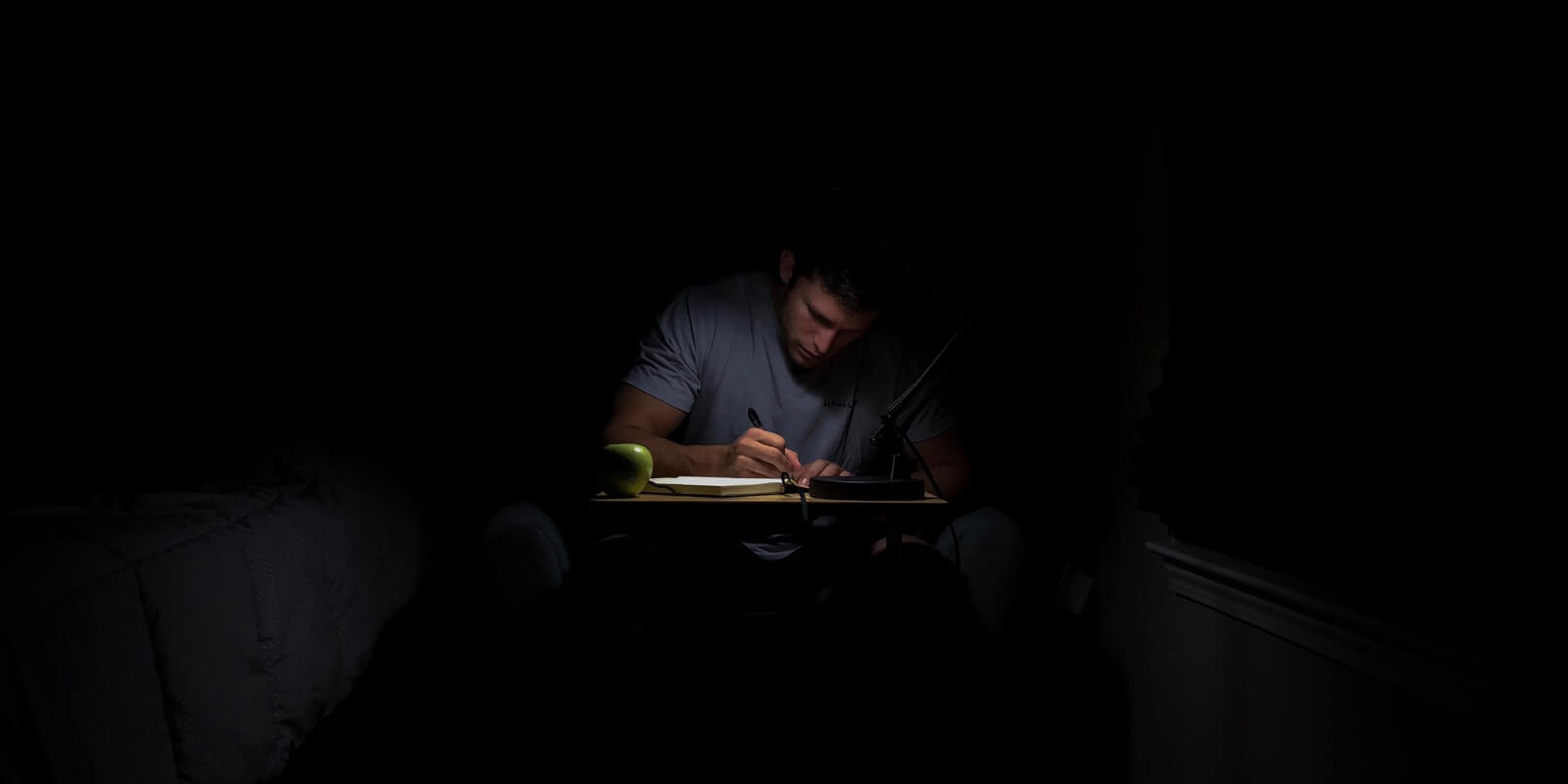When people first start therapy, I usually ask them what they hope to get out of our work together.
Nine times out of ten, their answer is some version of this:
I want some tools and coping strategies to deal with my anxiety/depression/anger/etc.
This is understandable. When you cut your finger chopping vegetables, you put a Band-Aid on it. When you get a headache, you take some Tylenol. And when you feel stressed, you take a hot bath or do some deep breathing exercises.
It makes sense, then, that when people develop more significant emotional struggles, they would show up to therapy asking for the bigger, stronger version of their coping strategies.
Because we’ve been trained to think of health as the absence of disease, we don’t really think about our health until something’s wrong—at which point we expect a pill, technique, surgical intervention, mantra, or some other coping strategy to make things better.
While this may work for the occasional scraped knee or headache, I’d like to suggest that coping is not an optimal approach to health—physical, emotional, or otherwise. But more than that, the overarching attitude of coping often leads to the exact opposite of its intended effect—emotional fragility and increased long-term suffering.
Of Gunshots and Paper Cuts
Like I said, there’s nothing wrong with a Band-Aid per se. If your problem is a simple scraped knee, coping with it by applying a bandage is a perfectly reasonable path toward health.
Unfortunately, most health problems—especially mental health problems—are rarely as simple as a scraped knee.
Suppose you wake up one morning feeling anxious and on edge. There’s no obvious cause or trigger for anxiety, so you brush it off and hop in the shower. But 30 minutes later as you’re making coffee, you realize the anxiety’s still there, and maybe a tad worse than it had been earlier.
So you reach into your “tool belt” of coping strategies and apply one: Maybe you pop a Xanax or throw a few shots of whiskey into your coffee; maybe you do a deep breathing technique or some mindfulness meditation for a few minutes; or maybe you flip through your notes from your last therapy session trying to recall that insightful quip about anxiety from your therapist.
Any one of these coping strategies may well “work” to alleviate your anxiety. But whether it genuinely works or not in the long-run depends on the nature of the problem itself.
Is your morning anxiety a random occurrence, like the occasional headache or paper cut? Perhaps. In which case, your coping skill may be a fine solution.
But what if it’s more than that? What if your anxiety isn’t a problem itself, but instead, a symptom of a deeper problem?
What if by trying to fix the emotion with a coping skill you’re actually shooting the messenger and ignoring the message?
Paper cuts and gunshot wounds are superficially similar in the sense of bleeding. But you don’t have to be an MD to realize they are actually completely different problems requiring completely different solutions.
While a little burst of nervousness or low mood doesn’t necessarily point to deeper emotional issues, it would be foolish to assume that they never do. Unfortunately, the coping skills approach to mental health encourages us to do just that.
The problem with coping skills is the mindset they foster.
To see the problem with coping skills, you have to look beyond the obvious and start to see second-order effects.
Superficially, a little deep breathing may help you feel less anxious. But the longer-term effect of coping with your anxiety is the message you’re reinforcing: that the solution to feeling bad emotionally is to do something that makes you feel good now.
Unfortunately, this is almost never the case.
The most effective treatment for most anxiety problems is exposure therapy, which means deliberately exposing yourself to the thing you’re afraid of in order to recalibrate your brain’s threat-detection mechanisms.
One of the most effective treatments for depression is behavioral activation, which means forcing yourself to do pleasurable or meaningful activities despite not feeling motivated to do so.
Much like addressing a gunshot wound means doing a painful surgery before the wound can truly heal, most emotional struggles require feeling worse before you can feel better.
Digging into the root cause of your morning anxiety may be painful. Perhaps your morning anxiety before work is actually a symptom of spending years and decades of your life doing something you don’t like and don’t find meaningful?
Coping with that anxiety with a little mindfulness meditation is like putting a Band-Aid on a gunshot wound. It might stop the bleeding for a minute or two, but at best you’re just kicking the can down the road. Unfortunately, it’s actually worse than that.
The more we therapists and mental health professionals push coping skills as a solution to emotional difficulties, the more we engender a coping skills theory of mental health in our clients. The second-order effect is that we train people to avoid searching for underlying root causes of their suffering. By emphasizing coping skills and the alleviation of short-term emotional pain, we ironically lead out clients toward emotional ignorance and long-term suffering.
How often do you use your emergency brake?
To be clear, I think coping skills have their place.
My concern is that precisely because they’re often an effective way to feel better now, they will lead to feeling far worse in the future.
Put another way, I think we easily become addicted to coping skills. And like most forms of addiction, while they feel good in the moment, the self-deception they can engender often leads to tragic long-term effects.
Like your car’s emergency brake, coping skills are good to have but should be used sparingly—and rarely relied upon.





33 Comments
Add YoursSolid Gold
Thanks, Jen!
Nick, I have suffered from Depression and anxiety for most of my life but once again you are right on the mark. Thank you for your thoughtful approach to the issues I deal with daily.
You’re very welcome, Thomas!
I have been long-term depressed but your advice is always nail on the head type and as I am feeling receptive to clear instruction I’ve decided to set myself the challenge of completing at least 1 exposure task and 1+ behavioral activities daily..Thankyou.
You’re very welcome, Vivienne. Glad it was helpful!
Vivienne, thank you for sharing this. I plan to try this as well.
Thank you, I needed to read this
You’re welcome, Ronny!
The root cause after prolonged anxiety morphs into a habit pattern despite root cause losing its vitality.
I have to say, Nick your writings are thought provoking and helpful. So many counsellors do what you are warning against ie they suggest an over-use of sticking plasters like mindfulness. I suppose the question is what else to do? To that end it might be useful for people to know about behavioural activation.
Thanks, Stephen. Yeah, this was more of a Think-different piece than a how-to.
I think the basic answer, though, is habits.
For example, mindfulness meditation as an occasional coping strategy is not all that helpful. But mindfulness meditation as a daily habit can be immensely beneficial for mental health.
This was unique and excellent.
Thank you, Mike!
I find that once we just get and do; the anxiety subsides. Thank you for reminding me.
You bet, Pat!
Would you conflate or differentiate coping skills and “self-care”? I’m thinking of exercise, hobbies that (for a depressed person) might constitute behavioral activation but also distract from and take time from sitting with ourselves.
I still look forward to every Monday! Thank you.
Thanks, Annie! And yeah, to me, self-care is a set of regular activities that promote one’s mental health.
I think the consistency part is key.
It’s consistent habits and exercises that have the most benefit to our mental health compared to one-off strategies that we implement only when we need them.
Hi Nick,
I like the way you think …. regarding removing the bullet rather than put a band aid on the problem.
My anger problems have never been resolved.. my anger has turned into rage… the montra from friends and family is .. oh “ just let go of it “
When a great injustice has been done to you by a parent … it can seem impossible to “ just let go” after years of therapy….. I have just given up…
I feel rage on a daily basis….. awful huh? And yes I use coping Strategies
Daily.
Hey Lynda,
Yeah, I don’t love “let it go” as advice because it implies that a single decision or action should suffice to lessen our suffering.
In my experience, if something awful happens to you, you will always feel some amount of hurt and anger over it.
I appreciate your messages! What would be some examples of “behavioral activation” that we should force ourselves to do? Thanks~
Thanks, Chloe. With behavioral activation, the specific activity is less important I think than the concept behind it which is that we should do healthy things regularly despite how we feel—motivated or unmotivated, energetic or lethargic.
The question is, what are the activities that normally “fill my tank” and how can I design a system that ensures that I continue to engage in those activities even when I don’t “feeel it.”?
I like the use of the phrase “design a system.” Too easily my approach to anxiety recovery can be to regularly listen to podcasts, read new articles and blogs, think that they contain great ideas and methods, and then pretty much carry on with my usual activities and thinking, maybe with an extra couple of post-it notes to remind me of one of the ideas.
Maybe you could do a “how to design and implement your beneficial system” article? I promise I won’t just put a reminder about it on a post-it!
Hi Nick – I just came across your blog a few days ago and wanted to let you know that reading your articles has already helped me so much with my getting my anxiety under control. I am so grateful – thank you for making the world a little better 🙂
Awe, thanks Alyssa! So glad they’ve been helpful 🙂
One of the challenges I face as a therapist is that people want you to alleviate their suffering quickly, so the “tips and tricks” approach is what they are pleading for. It is hard to break it to them (as I often do) that there are truly no shortcuts to mental health. We all have to do the work, including confronting fears, building healthy habits and staying with (mindfulness) our experiences. Once they get that, we can make real progress.
Right! In some ways it a philosophy problem… Thinking clearly about mental health and how it works is often a precondition for making meaningful changes. Thanks Patty!
Thank you Nick!
You’re welcome!
Your quote: “The question is, what are the activities that normally “fill my tank” and how can I design a system that ensures that I continue to engage in those activities even when I don’t “feeel it.”?”
What happens when all your daily “feel good” activities no longer work? I have done everything I have been told to do. I try to “fill my tank” everyday with things I enjoy. Within 30 minutes of finishing them I am back at either 12/10 hyper-vigilance or -12/10 depression. My activities include things I have always loved and some new stuff I find interesting too.
BTW. Not criticising. I love your blogs.
It’s so so hard to convince professionals that I don’t want coping mechanisms, I want to open the dungeon door and slay the beast. And so hard to stop self-gaslighting and thinking that I should just be normal and settle for a leaflet and another grounding technique despite feeling so deeply, for so long, that this just isn’t for me. And then so hard to stop interpreting everything human as a sign of ‘something wrong with me’. It’s about that
Balance again, ey?
Thank you for this.
This may possibly be the best explanation for how messed up I am. Truly. It is actually encouraging to know that my coping with problems (and not well, and not healthily) have kept them around for way longer than action to fix them would have. Perhaps the equivalent to placing black tape over a car’s check engine light?!
Hi Nick
Had i know you in 2012 ,i thinkl i could have made made much more better decisions about my life other than thinking that i was coping
Thanks Nick for this